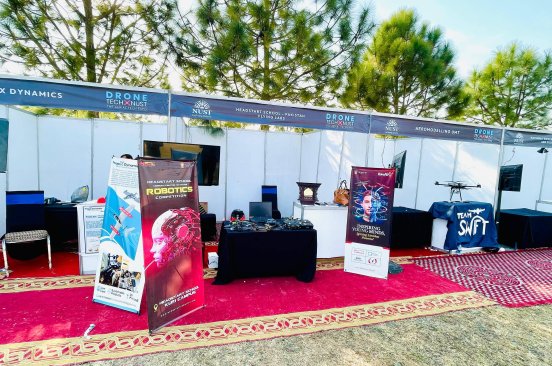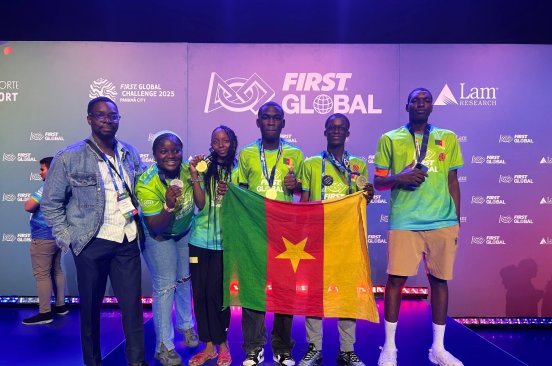
Fly for the Future: Morocco Flying Labs Equips Students for Future Careers with Drone Training
As part of the Fly for the Future program, Morocco Flying Labs conducted three projects for National School of Applied Sciences students in Oujda, Morocco.
July 21st, 2023
Picture this: a group of young enthusiasts armed with cutting-edge technology taking to the skies, ready to conquer the world's problems. While this may seem like a scene from the latest superhero movie, it is, in fact, a reality that is swiftly unfolding. Drones, those marvelous flying machines, are revolutionizing how we approach problem-solving and training our youth to handle them is an investment we can't afford to overlook. This belief is the engine that drives the Fly for the Future program.
The Fly for the Future project aims to allow students from rural areas to explore the technologies of drones and robotics. As part of this endeavor, Morocco Flying Labs conducted three projects for National School of Applied Sciences students in Oujda, Morocco. These projects took place on the 6th and the 27th of June 2022 and the 19th of March 2023, and they brought together 65 students between 21 and 25 years old.
Training Program
We structured each project in two parts: a theoretical session in the morning and a practical session in the afternoon, covering various topics.
- Theoretical session:
- A presentation on drones and their applications
- A session on safety and risk management procedures
- Practical session:
- A manual drone flying session
- An automatic flight session
- Processing of automatic flight data
Theoretical Session
We started the training with a theoretical presentation explaining drone technology's basic concepts and principles. We discussed the different categories of drones, how each works, and the various applications of drone technology in our world. In line with the Flying Labs Network mission, we also discussed the ethical and social implications of drone use and how to ensure that our drone projects are aligned with our local needs and context. To ensure our crews' safety, we also lectured on drone operations, preflight checklists, and safety measures.
In the second half of the session, we introduced the students to one specific application of drones: mapping. Choosing a project that would be relevant to them, we tasked them to map their school. We needed to conduct a flight mission to collect and process images.
We demonstrated using the PIX4Dcapture app to conduct the automatic flight mission and collect images. After that, we showed them two mapping solutions to process the data. These were the PIX4Dreact app and OpenDroneMap, a free and open-source application.
Practical Session
For the practical sessions, we had two DJI Mavic Pro 2 drones. We split the students into groups, each with five students and two trainers. We then showed each group how to control the drone using a remote controller and a smartphone. Each student had around 10 minutes to conduct manual flights.
In the second half of the practical sessions, we taught them how to program automatic missions and tune each scenario's parameters using the PIX4Dcapture app on a smartphone. With this knowledge, they can plan and execute autonomous flights and collect images for mapping purposes.
After flying the drones all over the school campus, we collected and processed the images using PIX4Dreact and OpenDroneMap. Finally, we showed them how to visualize and analyze the results using QGIS software.
A Great Success
The project was successful; the students were enthusiastic and engaged throughout the sessions. They learned a lot about drones, their potential for social good, and how to operate them safely and responsibly. They also gained hands-on experience in drone mapping and data processing, valuable skills for their future careers.
As we look to the future, it's crucial to recognize the untapped potential lying within the palms of our young drone enthusiasts. In a world of challenges, we must nurture a generation of drone-savvy superheroes ready to soar above the clouds and bring positive change. Across the globe, young minds have already demonstrated the incredible impact of drone training. By fostering their creativity and providing the necessary skills in emerging technologies, we can unlock a world of innovative solutions and take on challenges that previously seemed insurmountable.
We were thrilled to share our knowledge and expertise with the National School of Applied Sciences students, and we hope to continue collaborating with them on future projects. Thank you to them for their enthusiastic participation and to Fondation Botnar for making the Fly for the Future program possible.
Stay tuned for more posts about our projects, and let us watch together as our future takes flight, one drone at a time!
Category(s)
Recent Articles
View All »

Team Cameroon's Road to Victory at the First Global Robotics Competition 2025
